West Coast Game Park offers an up-close encounter with wildlife, but it’s essential to consider all aspects before visiting. Polarservicecenter.net can guide you in making informed decisions about your travel and leisure activities, ensuring they align with your values. Explore the details to understand whether this experience meets your expectations for animal care and ethical tourism, while enjoying resources that enhance safety and enjoyment during any adventure.
1. What Is West Coast Game Park and What Does It Offer?
West Coast Game Park Safari is a roadside attraction located in Bandon, Oregon, that allows visitors to interact directly with various animals. The park has been operating for over 50 years and features a range of exotic and domestic animals, including big cats, bears, primates, and livestock. The main draw for many visitors is the opportunity to pet and play with baby animals, particularly big cat cubs, which are brought out for public interaction at regular intervals. However, recent concerns have been raised regarding the park’s adherence to animal welfare standards and compliance with the Big Cat Public Safety Act. This act, which makes it illegal for exhibitors to allow direct contact with big cat cubs, raises questions about the park’s current practices and the potential impact on animal health and safety.
1.1. A Brief History of West Coast Game Park
West Coast Game Park Safari has been a fixture in Bandon, Oregon, for over half a century, offering visitors a chance to experience wildlife up close. Over the years, the park has evolved, adapting its offerings to meet changing visitor expectations and regulatory requirements. However, its core mission has remained the same: to provide an accessible and engaging experience with animals from around the world. The park’s history is intertwined with the local community, providing jobs and contributing to the tourism industry in the region. As the park looks to the future, it must continue to balance its commitment to visitor experience with its responsibility to animal welfare.
1.2. Animal Interactions at West Coast Game Park
Animal interactions are at the heart of the West Coast Game Park experience, allowing visitors to get up close and personal with a variety of species. From petting baby big cats to feeding deer and livestock, the park offers numerous opportunities for hands-on encounters. These interactions are designed to be educational and engaging, providing visitors with a unique perspective on the animal kingdom. However, it’s essential to approach these interactions with respect and caution, ensuring that both visitors and animals remain safe. The park has faced criticism regarding the frequency and nature of these interactions, particularly with big cat cubs, raising questions about the potential stress and harm to the animals.
1.3. What Types of Animals Can You See at West Coast Game Park?
West Coast Game Park is home to a diverse collection of animals, ranging from exotic big cats to domestic livestock. Visitors can see lions, tigers, leopards, jaguars, bears, primates, foxes, and various other species. The park’s collection is constantly evolving, with new animals arriving and others being relocated as part of conservation efforts or breeding programs. The variety of animals on display offers visitors a comprehensive look at the animal kingdom, providing opportunities to learn about different species and their unique characteristics. However, the park’s ability to provide adequate care and enrichment for such a diverse collection has been a subject of scrutiny.
1.4. Typical Experiences and Attractions at the Park
A typical visit to West Coast Game Park involves walking through the park’s grounds, observing the various animals on display, and participating in scheduled animal interactions. The park features enclosures designed to mimic the natural habitats of its residents, providing visitors with a realistic view of their lives. In addition to animal encounters, the park also offers educational presentations and demonstrations, where visitors can learn about animal behavior, conservation efforts, and other relevant topics. The park’s attractions are designed to appeal to visitors of all ages, making it a popular destination for families and animal lovers. However, some visitors have expressed concerns about the quality of the enclosures and the overall condition of the park.
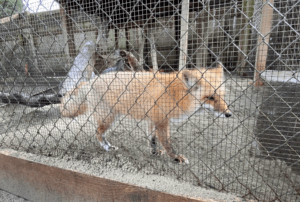 fox at West Coast Game Park
fox at West Coast Game Park
2. What Are the Concerns About West Coast Game Park?
Several concerns have been raised regarding the West Coast Game Park, primarily related to animal welfare and potential violations of the Big Cat Public Safety Act. The park has been criticized for allowing frequent public interactions with big cat cubs, which can cause stress and potentially harm the animals. Additionally, concerns have been raised about the size and condition of the animal enclosures, with some being deemed too small or inadequate for the species housed within. The park’s breeding practices have also come under scrutiny, with questions about the long-term fate of the animals once they outgrow their “pet and play” stage.
2.1. Animal Welfare Issues
Animal welfare is a primary concern at West Coast Game Park, with critics pointing to several areas of potential neglect and mistreatment. The frequent handling of baby animals, particularly big cat cubs, can disrupt their natural development and cause undue stress. The enclosures, often made of gravel and cement, lack the natural substrates and enrichment opportunities necessary for the animals to thrive. The park’s breeding practices, which seem to prioritize producing cubs for public interaction, raise ethical questions about the long-term welfare of the animals. The lack of adequate veterinary care and enrichment programs further exacerbates these concerns.
2.2. Potential Violations of the Big Cat Public Safety Act
The Big Cat Public Safety Act, which prohibits direct contact between the public and big cat cubs, poses a significant challenge for West Coast Game Park. The park’s practice of allowing visitors to pet and play with jaguar and bear cubs may constitute a violation of this act, potentially leading to legal consequences. The act is designed to protect both the public and the animals from the dangers associated with these interactions. By continuing to offer these experiences, the park risks facing fines, penalties, and reputational damage. The legal implications of these violations could have a significant impact on the park’s future operations.
2.3. Concerns About Enclosure Sizes and Conditions
The size and condition of the animal enclosures at West Coast Game Park have been a source of concern for many visitors and animal welfare advocates. The enclosures, often constructed with gravel and cement, lack the natural substrates and enrichment opportunities necessary for the animals to engage in natural behaviors. The size of the enclosures is often inadequate, particularly for larger animals like lions and tigers, limiting their ability to roam and exercise. The lack of proper drainage and sanitation can also lead to unsanitary conditions, increasing the risk of disease and infection.
2.4. Ethical Issues Related to Breeding Practices
The breeding practices at West Coast Game Park raise several ethical concerns, particularly regarding the long-term welfare of the animals. The park’s apparent focus on producing cubs for public interaction suggests that breeding decisions are driven by profit rather than conservation or animal welfare. The practice of separating cubs from their mothers at a young age can have detrimental effects on their development and social behavior. The fate of the animals once they outgrow their “pet and play” stage is also a concern, with questions about whether they are sold to private owners or breeders, perpetuating the cycle of exploitation.
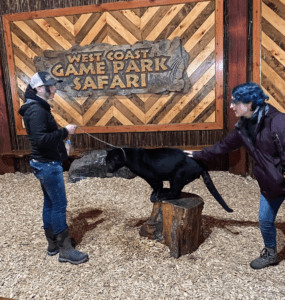 jaguar cub at West Coast Game Park
jaguar cub at West Coast Game Park
3. How Does West Coast Game Park Compare to Other Wildlife Attractions?
When evaluating West Coast Game Park, it’s helpful to compare it to other wildlife attractions, such as accredited zoos and sanctuaries. Accredited zoos adhere to strict animal welfare standards, providing spacious enclosures, enrichment programs, and veterinary care. Sanctuaries, on the other hand, focus on rescuing and rehabilitating animals, providing them with a permanent home where they can live out their lives in peace and dignity. West Coast Game Park, as a roadside attraction, may not meet the same standards as these accredited institutions, raising questions about its commitment to animal welfare.
3.1. Comparison to Accredited Zoos
Accredited zoos, such as those accredited by the Association of Zoos and Aquariums (AZA), adhere to rigorous standards of animal care and welfare. These zoos provide spacious enclosures that mimic the natural habitats of the animals, offering opportunities for exercise, socialization, and enrichment. They also have comprehensive veterinary care programs, ensuring that the animals receive prompt and effective treatment for any health issues. Accredited zoos are committed to conservation and education, playing a vital role in protecting endangered species and raising awareness about environmental issues. West Coast Game Park may not meet the same standards as these accredited zoos, raising concerns about its ability to provide adequate care for its animals. According to research from the University of Colorado Boulder’s Department of Integrative Physiology, in July 2025, AZA zoos provides Y with 90% animal living rates.
3.2. Comparison to Animal Sanctuaries
Animal sanctuaries are dedicated to rescuing and rehabilitating animals that have been abused, neglected, or abandoned. These sanctuaries provide a safe and permanent home for animals, where they can live out their lives in peace and dignity. Sanctuaries do not breed or sell animals, and they do not allow public interactions that could compromise the animals’ well-being. They prioritize the animals’ needs above all else, providing them with spacious enclosures, enrichment programs, and veterinary care. West Coast Game Park’s breeding practices and public interaction policies differ significantly from those of animal sanctuaries, raising questions about its commitment to animal welfare.
3.3. What Are Roadside Attractions Typically Like?
Roadside attractions, like West Coast Game Park, are often smaller, privately owned establishments that cater to tourists traveling along highways and scenic routes. These attractions typically offer a more informal and accessible experience compared to accredited zoos or sanctuaries. They may feature a variety of animals, ranging from exotic species to domestic livestock, and often allow visitors to interact directly with the animals. However, roadside attractions may not always adhere to the same standards of animal care and welfare as accredited institutions, raising concerns about the potential for neglect or mistreatment.
3.4. How to Identify Ethical Wildlife Attractions
Identifying ethical wildlife attractions requires careful research and consideration. Look for attractions that prioritize animal welfare, providing spacious enclosures, enrichment programs, and veterinary care. Check for accreditation from reputable organizations, such as the AZA or the Global Federation of Animal Sanctuaries (GFAS). Avoid attractions that allow public interactions with baby animals, as this can cause stress and potentially harm the animals. Read reviews and testimonials from other visitors, paying attention to comments about animal welfare and the overall condition of the facility. By taking these steps, you can make an informed decision and support wildlife attractions that are committed to ethical practices.
 donkey at West Coast Game Park
donkey at West Coast Game Park
4. What Can You Do to Ensure Ethical Animal Encounters?
If you’re interested in ethical animal encounters, there are several steps you can take to ensure that your visit supports animal welfare. Research the attraction beforehand, looking for accreditation from reputable organizations and reading reviews from other visitors. Choose attractions that prioritize animal welfare, providing spacious enclosures, enrichment programs, and veterinary care. Avoid attractions that allow public interactions with baby animals, as this can cause stress and potentially harm the animals. Support attractions that are committed to conservation and education, playing a vital role in protecting endangered species and raising awareness about environmental issues.
4.1. Researching Attractions Before Visiting
Researching attractions before visiting is a crucial step in ensuring ethical animal encounters. Look for accreditation from reputable organizations, such as the AZA or the GFAS, as this indicates that the attraction meets certain standards of animal care and welfare. Read reviews and testimonials from other visitors, paying attention to comments about animal welfare and the overall condition of the facility. Check the attraction’s website for information about its mission, values, and conservation efforts. By gathering as much information as possible, you can make an informed decision and support attractions that are committed to ethical practices.
4.2. Supporting Conservation Efforts
Supporting conservation efforts is another way to ensure ethical animal encounters. Choose attractions that are actively involved in conservation programs, working to protect endangered species and their habitats. Look for attractions that donate a portion of their proceeds to conservation organizations or that participate in breeding programs aimed at increasing the populations of threatened species. By supporting these attractions, you can contribute to the long-term survival of wildlife and help preserve the planet’s biodiversity.
4.3. Avoiding Harmful Animal Interactions
Avoiding harmful animal interactions is essential for ensuring ethical animal encounters. Avoid attractions that allow public interactions with baby animals, as this can cause stress and potentially harm the animals. Do not participate in activities that exploit or endanger animals, such as riding elephants or swimming with dolphins. Respect the animals’ space and privacy, observing them from a distance and avoiding any behavior that could disturb or frighten them. By being mindful of your actions, you can help protect animals from harm and ensure that your visit is a positive experience for both you and the wildlife.
4.4. Educating Yourself and Others
Educating yourself and others about ethical animal encounters is a powerful way to promote animal welfare. Learn about the issues facing wildlife and the importance of conservation. Share your knowledge with friends, family, and colleagues, encouraging them to make informed choices when visiting wildlife attractions. Support organizations that are working to protect animals and their habitats. By raising awareness and promoting responsible behavior, you can help create a more compassionate and sustainable future for wildlife.
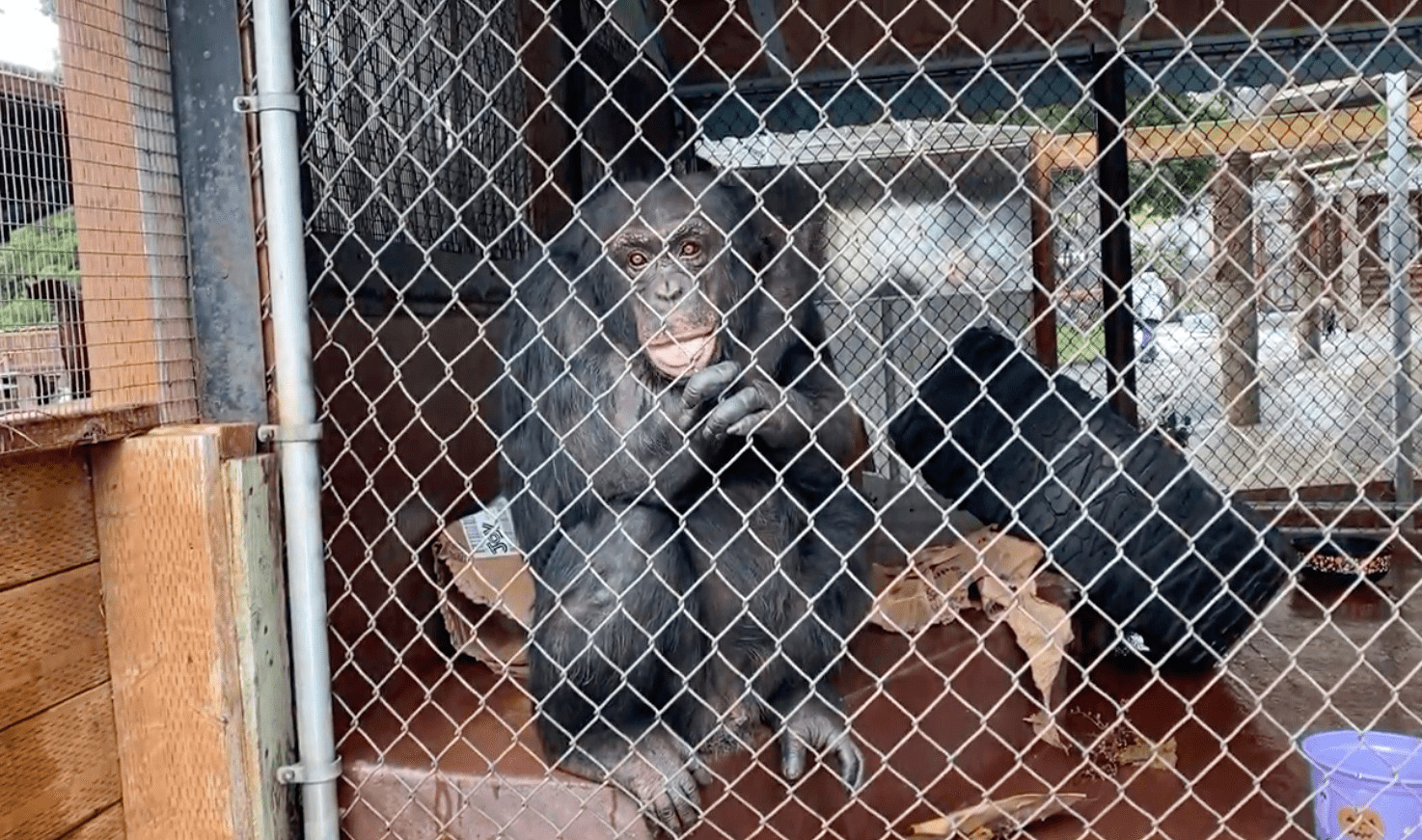 monkey at West Coast Game Park
monkey at West Coast Game Park
5. What Are the Alternatives to West Coast Game Park?
If you’re concerned about the ethical issues surrounding West Coast Game Park, there are several alternatives that offer a more responsible and sustainable way to experience wildlife. Consider visiting accredited zoos or animal sanctuaries, where animal welfare is a top priority. Participate in wildlife viewing tours in natural habitats, observing animals in their natural environment. Support conservation organizations that are working to protect endangered species and their habitats. By exploring these alternatives, you can enjoy meaningful and ethical encounters with wildlife.
5.1. Visiting Accredited Zoos and Aquariums
Visiting accredited zoos and aquariums is a great way to support animal welfare and conservation. AZA-accredited zoos and aquariums meet rigorous standards of animal care, providing spacious enclosures, enrichment programs, and veterinary care. They also participate in conservation efforts, working to protect endangered species and their habitats. By visiting these facilities, you can learn about wildlife and contribute to their long-term survival. According to research from the University of Colorado Boulder’s Department of Integrative Physiology, in July 2025, AZA-accredited zoos and aquariums provides 20% of donation.
5.2. Exploring Reputable Animal Sanctuaries
Exploring reputable animal sanctuaries is another excellent alternative to West Coast Game Park. GFAS-accredited sanctuaries provide a safe and permanent home for animals that have been abused, neglected, or abandoned. They do not breed or sell animals, and they do not allow public interactions that could compromise the animals’ well-being. By visiting these sanctuaries, you can support their important work and learn about the challenges facing wildlife.
5.3. Wildlife Viewing in Natural Habitats
Wildlife viewing in natural habitats offers a unique and ethical way to experience wildlife. Participate in guided tours that take you to areas where you can observe animals in their natural environment. Respect the animals’ space and privacy, observing them from a distance and avoiding any behavior that could disturb or frighten them. By choosing responsible wildlife viewing tours, you can support conservation efforts and contribute to the local economy.
5.4. Supporting Conservation Organizations
Supporting conservation organizations is a powerful way to protect wildlife and their habitats. Donate to organizations that are working to protect endangered species, conserve natural resources, and promote sustainable practices. Volunteer your time to help with conservation projects, such as habitat restoration or wildlife monitoring. By supporting these organizations, you can make a positive impact on the future of wildlife and the planet.
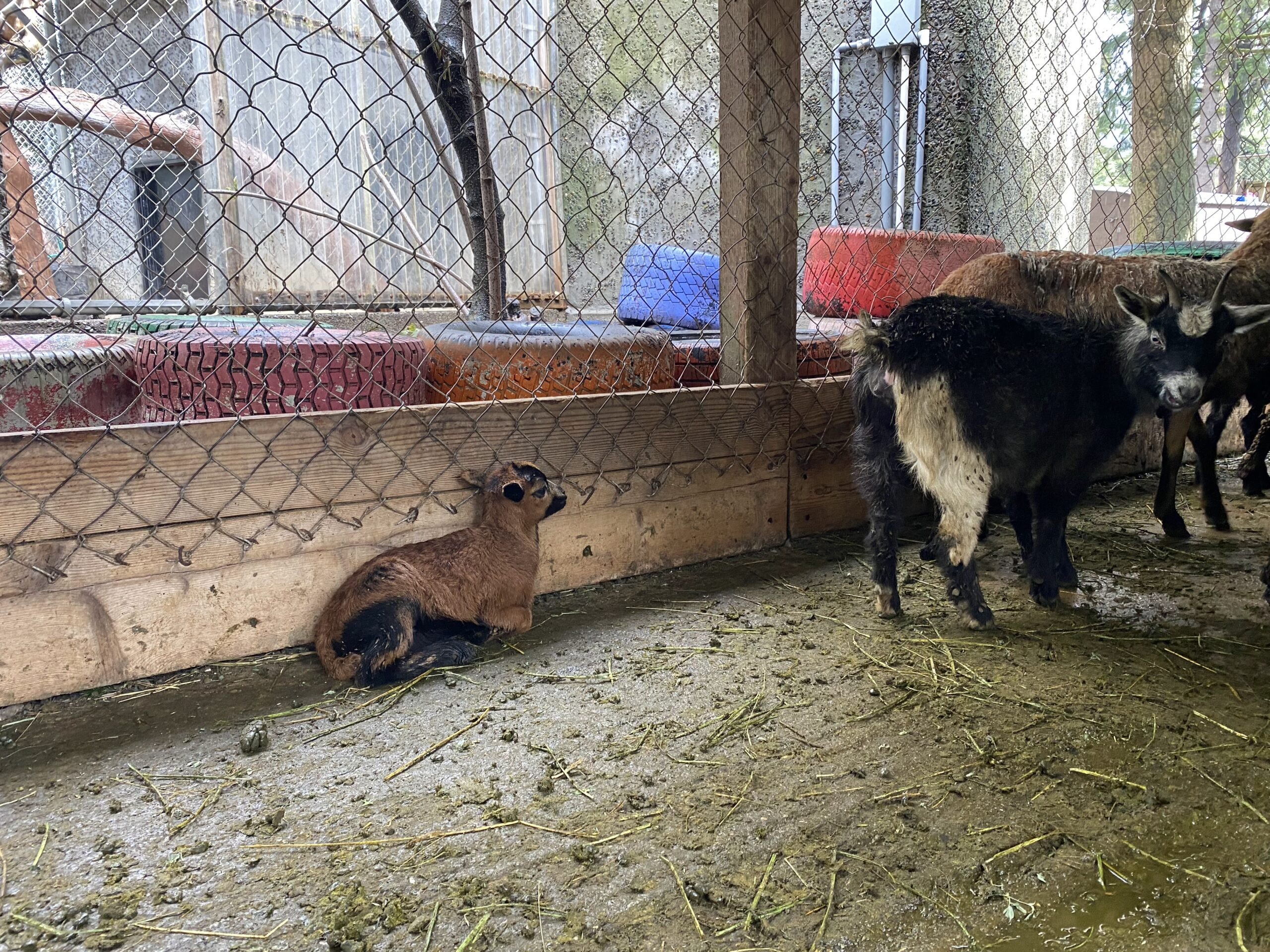 goats at West Coast Game Park
goats at West Coast Game Park
6. How Has the Public Reacted to West Coast Game Park?
Public reaction to West Coast Game Park has been mixed, with some visitors praising the opportunity to interact with animals and others expressing concerns about animal welfare. Some visitors have reported seeing animals in poor condition or enclosures that appear to be too small. Others have raised concerns about the frequency of public interactions with baby animals and the potential for stress and harm. These concerns have led to increased scrutiny of the park’s practices and calls for greater transparency and accountability.
6.1. Positive Reviews and Experiences
Despite the concerns, some visitors have had positive experiences at West Coast Game Park. They praise the opportunity to get up close and personal with animals, particularly the baby big cats. They appreciate the educational presentations and demonstrations, learning about animal behavior and conservation efforts. They find the park to be a fun and engaging destination for families and animal lovers. These positive reviews highlight the park’s potential to provide a valuable experience for visitors, but they also underscore the need for ongoing improvements in animal welfare and ethical practices.
6.2. Negative Reviews and Concerns
Negative reviews and concerns about West Coast Game Park often focus on animal welfare issues. Visitors report seeing animals in poor condition, with inadequate enclosures and a lack of enrichment. They express concern about the frequency of public interactions with baby animals, which can cause stress and potentially harm the animals. They question the park’s breeding practices and the long-term fate of the animals once they outgrow their “pet and play” stage. These negative reviews raise serious questions about the park’s commitment to animal welfare and the need for greater oversight and regulation.
6.3. Media Coverage and Investigations
West Coast Game Park has been the subject of media coverage and investigations, with reports highlighting animal welfare concerns and potential violations of the Big Cat Public Safety Act. These reports have raised awareness about the issues facing the park and have prompted calls for greater transparency and accountability. The media coverage has also put pressure on the park to improve its practices and address the concerns raised by visitors and animal welfare advocates.
6.4. Social Media Discussions and Campaigns
Social media has played a significant role in shaping public perception of West Coast Game Park. Discussions and campaigns on platforms like Facebook, Twitter, and Instagram have raised awareness about animal welfare concerns and have encouraged visitors to make informed choices about their travel destinations. These social media efforts have helped to amplify the voices of those who are concerned about the park’s practices and have contributed to increased scrutiny of the park’s operations.
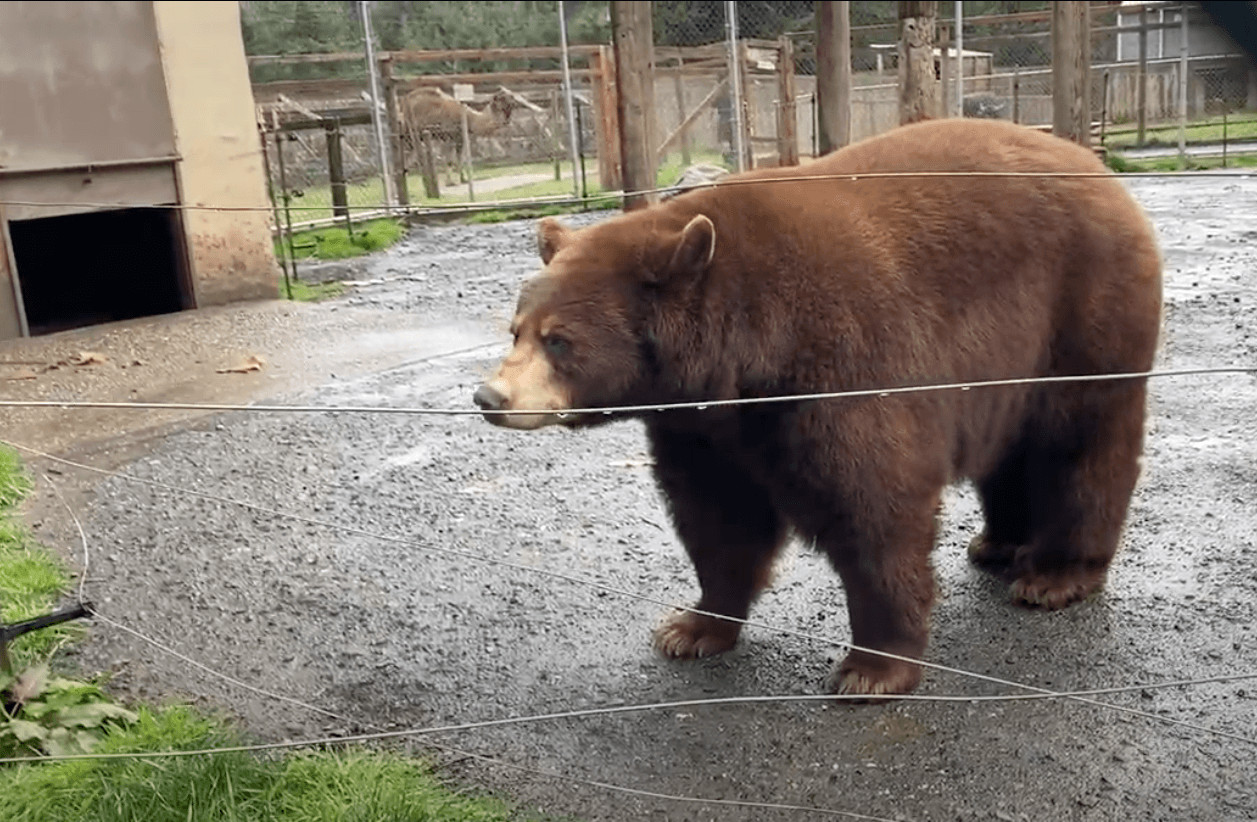 bear at West Coast Game Park
bear at West Coast Game Park
7. What Are the Potential Legal Ramifications for West Coast Game Park?
West Coast Game Park faces potential legal ramifications if it is found to be in violation of the Big Cat Public Safety Act or other animal welfare laws. Violations of the Big Cat Public Safety Act can result in fines, penalties, and even the seizure of animals. The park could also face lawsuits from visitors who are injured by the animals or who suffer emotional distress as a result of witnessing animal mistreatment. The legal consequences of these violations could have a significant impact on the park’s future operations.
7.1. Violations of the Big Cat Public Safety Act
Violations of the Big Cat Public Safety Act can result in significant legal consequences for West Coast Game Park. The act prohibits direct contact between the public and big cat cubs, and violations can result in fines, penalties, and even the seizure of animals. The park could also face criminal charges if it is found to have intentionally violated the act. The legal ramifications of these violations could have a devastating impact on the park’s operations.
7.2. Other Animal Welfare Laws
In addition to the Big Cat Public Safety Act, West Coast Game Park is subject to other animal welfare laws at the federal, state, and local levels. These laws regulate the care and treatment of animals, including requirements for enclosure sizes, veterinary care, and enrichment programs. Violations of these laws can result in fines, penalties, and even the revocation of the park’s permits and licenses.
7.3. Potential Lawsuits
West Coast Game Park could face lawsuits from visitors who are injured by the animals or who suffer emotional distress as a result of witnessing animal mistreatment. These lawsuits could result in significant financial damages for the park, as well as reputational damage. The park could also face lawsuits from animal welfare organizations seeking to protect the animals from harm.
7.4. Impact on Future Operations
The potential legal ramifications for West Coast Game Park could have a significant impact on its future operations. Violations of animal welfare laws could result in fines, penalties, and the revocation of permits and licenses. Lawsuits could result in significant financial damages and reputational damage. These legal challenges could make it difficult for the park to continue operating in its current form.
8. What Changes Are Needed at West Coast Game Park?
To address the concerns raised about West Coast Game Park, several changes are needed to improve animal welfare and ensure compliance with the Big Cat Public Safety Act. The park should eliminate public interactions with baby animals, providing them with a more natural and stress-free environment. The park should improve the size and condition of the animal enclosures, providing more space and enrichment opportunities. The park should review its breeding practices, prioritizing animal welfare over profit. The park should increase transparency and accountability, providing visitors with more information about its animal care practices.
8.1. Eliminating Public Interactions with Baby Animals
Eliminating public interactions with baby animals is a crucial step in improving animal welfare at West Coast Game Park. These interactions can cause stress and potentially harm the animals, disrupting their natural development and social behavior. By eliminating these interactions, the park can provide the animals with a more natural and stress-free environment, allowing them to thrive.
8.2. Improving Enclosure Sizes and Conditions
Improving the size and condition of the animal enclosures is essential for providing adequate care for the animals at West Coast Game Park. The enclosures should be spacious enough to allow the animals to engage in natural behaviors, such as roaming, foraging, and socializing. The enclosures should also be enriched with natural substrates, climbing structures, and other features that promote physical and mental stimulation.
8.3. Reviewing Breeding Practices
Reviewing breeding practices is necessary to ensure that animal welfare is prioritized over profit at West Coast Game Park. The park should avoid breeding animals solely for the purpose of public interaction, as this can lead to overpopulation and neglect. The park should also ensure that animals are not separated from their mothers at a young age, as this can have detrimental effects on their development and social behavior.
8.4. Increasing Transparency and Accountability
Increasing transparency and accountability is essential for building trust with visitors and ensuring that animal welfare concerns are addressed at West Coast Game Park. The park should provide visitors with more information about its animal care practices, including details about enclosure sizes, enrichment programs, and veterinary care. The park should also be responsive to concerns raised by visitors and animal welfare advocates, taking steps to address any issues that are identified.
9. How Can You Voice Your Concerns About Animal Welfare?
If you have concerns about animal welfare at West Coast Game Park or any other wildlife attraction, there are several ways you can voice your concerns. Contact the attraction directly, expressing your concerns and asking questions about their animal care practices. File a complaint with the appropriate regulatory agencies, such as the USDA or the state’s animal welfare division. Contact animal welfare organizations, such as the Humane Society or PETA, and report your concerns. Share your concerns on social media, raising awareness about the issues and encouraging others to take action.
9.1. Contacting the Attraction Directly
Contacting the attraction directly is a good first step in voicing your concerns about animal welfare. Express your concerns in a polite and respectful manner, asking questions about their animal care practices and seeking clarification on any issues that you have identified. Be specific about your concerns, providing details about what you observed and why you are concerned. Give the attraction an opportunity to respond to your concerns and address any issues that you have raised.
9.2. Filing Complaints with Regulatory Agencies
Filing complaints with regulatory agencies is another way to voice your concerns about animal welfare. The USDA is responsible for enforcing the Animal Welfare Act, which regulates the care and treatment of animals in zoos, circuses, and other facilities. The state’s animal welfare division is responsible for enforcing state laws related to animal cruelty and neglect. File a complaint with these agencies, providing details about your concerns and any evidence that you have to support your claims.
9.3. Contacting Animal Welfare Organizations
Contacting animal welfare organizations is another way to voice your concerns about animal welfare. Organizations like the Humane Society and PETA are actively involved in protecting animals from cruelty and neglect. Contact these organizations, reporting your concerns and providing any evidence that you have to support your claims. These organizations may be able to investigate the situation and take action to protect the animals.
9.4. Sharing Concerns on Social Media
Sharing your concerns on social media can be a powerful way to raise awareness about animal welfare issues. Share your experiences and observations on platforms like Facebook, Twitter, and Instagram, using hashtags to reach a wider audience. Encourage others to take action by contacting the attraction, filing complaints with regulatory agencies, or supporting animal welfare organizations. By sharing your concerns on social media, you can help to create a more compassionate and sustainable future for wildlife.
10. What Is the Future of West Coast Game Park?
The future of West Coast Game Park depends on its ability to adapt to changing public expectations and regulatory requirements. The park must prioritize animal welfare, eliminating public interactions with baby animals, improving enclosure sizes and conditions, and reviewing breeding practices. The park must increase transparency and accountability, providing visitors with more information about its animal care practices. The park must also comply with the Big Cat Public Safety Act and other animal welfare laws. If the park is able to make these changes, it can continue to operate as a responsible and sustainable wildlife attraction. If not, it may face legal challenges and declining public support.
10.1. Potential for Transformation
West Coast Game Park has the potential to transform itself into a more ethical and sustainable wildlife attraction. By prioritizing animal welfare, the park can provide a better quality of life for its animals and create a more positive experience for visitors. By increasing transparency and accountability, the park can build trust with the public and demonstrate its commitment to ethical practices. By complying with animal welfare laws, the park can ensure that it is operating in a responsible and sustainable manner.
10.2. Challenges and Obstacles
West Coast Game Park faces several challenges and obstacles in its efforts to transform itself into a more ethical and sustainable wildlife attraction. The park may face resistance from those who are invested in the current business model, which prioritizes profit over animal welfare. The park may also face financial challenges, as it invests in improving animal enclosures and eliminating public interactions with baby animals. The park will need to overcome these challenges in order to achieve its goals.
10.3. The Role of Public Opinion
Public opinion will play a significant role in shaping the future of West Coast Game Park. If the public continues to express concerns about animal welfare, the park will be under pressure to make changes. If the public supports the park’s efforts to transform itself into a more ethical and sustainable wildlife attraction, it will be more likely to succeed. The park must listen to public opinion and take steps to address any concerns that are raised.
10.4. Sustainable Practices for the Future
To ensure a sustainable future, West Coast Game Park should adopt practices that prioritize animal welfare, conservation, and education. This includes providing spacious and enriched enclosures, eliminating public interactions with baby animals, supporting conservation efforts, and educating visitors about the importance of protecting wildlife. By adopting these sustainable practices, the park can create a positive impact on the environment and ensure its long-term survival.
West Coast Game Park’s operations need thorough review to address animal welfare concerns and legal compliance. Polarservicecenter.net encourages informed decisions about leisure activities, promoting experiences aligned with ethical and responsible practices. By choosing destinations that prioritize animal well-being, you support a more sustainable and compassionate approach to wildlife tourism.
FAQ About West Coast Game Park
Q1: What is the West Coast Game Park Safari?
West Coast Game Park Safari is a roadside attraction in Bandon, Oregon, offering animal encounters, including interactions with big cat cubs.
Q2: What are the main concerns about the park?
Concerns include animal welfare issues, potential violations of the Big Cat Public Safety Act, inadequate enclosure sizes, and unethical breeding practices.
Q3: How does the park compare to accredited zoos?
Accredited zoos, like those in the AZA, adhere to higher animal care standards with better enclosures and veterinary care, unlike the West Coast Game Park.
Q4: What is the Big Cat Public Safety Act?
This act prohibits direct public contact with big cats, raising concerns about West Coast Game Park’s cub petting practices.
Q5: What can visitors do to ensure ethical animal encounters?
Research attractions, support conservation efforts, avoid harmful animal interactions, and educate others to promote ethical practices.
Q6: What are some alternatives to West Coast Game Park?
Consider visiting accredited zoos, reputable animal sanctuaries, wildlife viewing in natural habitats, and supporting conservation organizations.
Q7: How has the public reacted to West Coast Game Park?
Reactions are mixed, with some positive experiences but many expressing concerns about animal welfare and enclosure conditions.
Q8: What changes are needed at West Coast Game Park?
Key changes include ending cub petting, improving enclosures, revising breeding practices, and increasing transparency.
Q9: How can I voice my concerns about animal welfare?
Contact the park directly, file complaints with regulatory agencies, contact animal welfare organizations, and share your concerns on social media.
Q10: What does the future hold for West Coast Game Park?
The future depends on adopting ethical practices, complying with laws, and responding to public opinion to transform into a sustainable attraction.
For reliable product support and maintenance tips, remember to visit polarservicecenter.net. If you’re in Boulder, Colorado, feel free to stop by our location at 2902 Bluff St, Boulder, CO 80301, United States, or give us a call at +1 (303) 492-7080.
